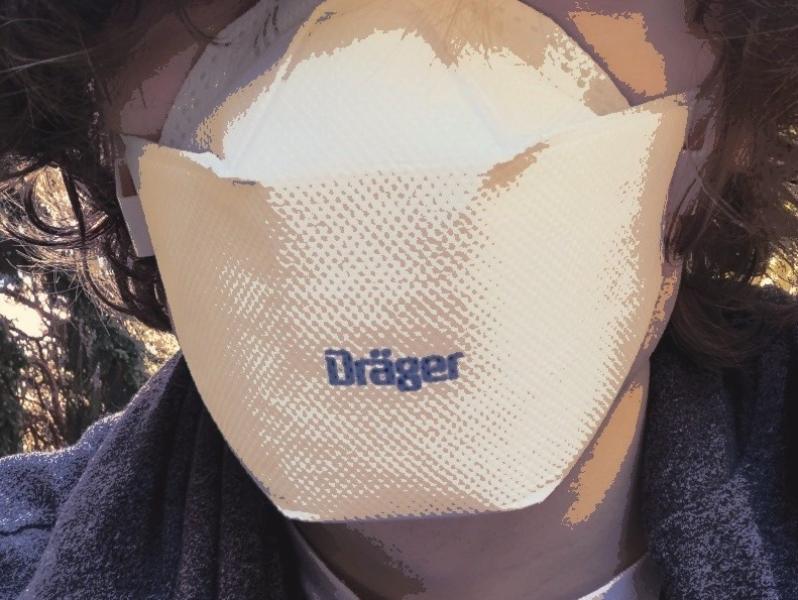
Updated 2025/03/27.
Respirators are masks, but not all masks are respirators. Using respirators to prevent airborne infectious disease is a practice with decades under its belt. In 1999, the CDC published a document titled TB Respiratory Protection Program In Health Care Facilities, in which they stated:
The use of respirators in the health care setting is a relatively new but important step forward in the efforts to prevent the transmission of tuberculosis (TB). Air purifying respirators provide a barrier to prevent health care workers from inhaling Mycobacterium tuberculosis. The level of protection a respirator provides is determined by the efficiency of the filter material and how well the facepiece fits or seals to the health care worker's face. A number of studies have shown that surgical masks will not provide adequate protection in filtering out the TB organism. Additionally, surgical masks are not respirators and therefore, are not NIOSH certified and do not satisfy OSHA requirements for respiratory protection.
By October 2020, OSHA published the following in their COVID-19 FAQ regarding respirators and particle size:
Will an N95 respirator protect the wearer from the virus that causes COVID-19?
Yes, an N95 respirator is effective in protecting workers from the virus that causes COVID-19. "N95" refers to a class of respirator filter that removes at least 95% of very small (0.3 micron) particles from the air. Some people have mistakenly claimed that since the virus that causes COVID-19 is approximately 0.1 microns in size, wearing an N95 respirator will not protect against such a small virus. That mistaken claim appears to result from a misunderstanding of how respirators work.
When an infected person expels the virus into the air by activities like talking, coughing, or sneezing, the airborne particles are composed of more than just the virus. The virus is part of larger particles that are made up of water and other materials such as mucus. These larger particles are easily trapped and filtered out by N95 respirators because they are too big to pass through the filter. This is called mechanical filtration. But mechanical filtration is just one of the ways that respirator filters keep particles from passing through the filter. An electrostatic charge also attracts particles to fibers in the filter, where the particles become stuck. In addition, the smallest particles constantly move around (called "Brownian motion"), and are very likely to hit a filter fiber and stick to it.
The National Institute for Occupational Safety and Health (NIOSH) tests respirators using particles that simulate a 0.3 micron diameter because this size particle is most likely to pass through the filter. If worn correctly, the N95 respirator will filter out at least 95% of particles this size. An N95 respirator is more effective at filtering particles that are smaller or larger than 0.3 microns in size [emphasis added].
The N95 respirator filter, as is true for other NIOSH-approved respirators, is very effective at protecting people from the virus causing COVID-19. However, it is important for employers and workers to remember that the respirator only provides the expected protection when used correctly.
In 2016, researchers from NIOSH and Nelson Laboratory measured bacterial and viral filtration efficiencies of 99.62 to 99.9% and 99.8 to 99.9%, respectively, with N95s from 3M, Moldex, Kimberly-Clark, Sperian-Willson, and US Safety.
Upgrading to an N99 or N100 — which are guaranteed to filter a minimum of 99% and 99.97% of particles 0.3 microns in size, respectively — would add filtration redundancy and exceed an N95's already-excellent filtration efficiency for bacteria and viruses (assuming proper fit and the absence of oil-based aerosols or alcohol vapor, both of which compromise the performance of the electret-based filter material).
Fit is paramount. A 2021 study from the Max Planck Institute in Germany found that fitted FFP2s — the European standard for respirators that filter a minimum of 94% of particles 0.3 microns in size — were 75 times more effective than surgical masks at preventing the transmission of infectious aerosols, and only 2.5 times more effective if those same respirators were loosely fitted. "It turns out that leakage dominates over filtration," study co-author Eberhard Bodenschatz told Axios in 2022.
As The Good Men Project recently reported:
Respirators are so effective that United Kingdom research has indicated their use by the public would have dropped the rate of COVID transmission by an estimated factor of 9, compared with 0.6 for surgical masks. A factor of 9 is enough to put SARS-COV-2 into exponential decay, meaning the virus would have been highly suppressed for as long as respirator use continued. The exponential math of viral spread also means that perfect masking compliance would not have been required to achieve suppression.
References:
- CDC – TB Respiratory Protection Program In Health Care Facilities
- OSHA – COVID-19 Frequently Asked Questions: Respirators and Particle Size
- Journal of Occupational and Environmental Hygiene – A comparison of facemask and respirator filtration test methods
- CDC – Fit Test FAQs
- Oliver F. Bischof – Oil Aerosols and Respiratory Protection
- Global Challenges – Filtration Performance Degradation of In-Use Masks by Vapors from Alcohol-Based Hand Sanitizers and the Mitigation Solutions
- Minute Physics – The Astounding Physics of N95 Masks
- PNAS – An upper bound on one-to-one exposure to infectious human respiratory particles
- Axios – Why we need to wear better masks
- The Good Men Project – How Denial of Airborne COVID Transmission Broke the World
- Nature – What if everyone had masked up? Analysis of app data has an answer
- Physical Review – Estimating the population-level effects of nonpharmaceutical interventions when transmission rates of COVID-19 vary by orders of magnitude from one contact to another [PDF]
- The New York Times – The Math of Ending the Pandemic: Exponential Growth and Decay
